The future of Fillets and Round Corners
-
@hieru said:
If you do find anyone willing to take Round Corners to the next level, how about starting a Kickstarter campaign to fund the exercise? I'd happily contribute to something like that.
Yep, that's the issue...trying to find a developer willing to take this on. I've asked quite a few and no one seems interested. Bummer.
-
+1 for this.
I would have done it myself if only my programming skills where good enough. I've looked at code from other software but translating it to ruby is too difficult for me.In SketchUp, maybe it would be possible to either store the original geometry on a hidden layer and recall it when wanting to edit it, or perhaps save the original geometry in a attribute and recreate it from there if needed to "simulate" none destructive editing.
-
Sorry Pilou, that doesn't work for me for three reasons:
-
The workflow is too long. It takes multiple steps with multiple plugins just to achieve.
-
It's terribly inaccurate having to scale down, then add bevel, then scale up. How to be accurate with such a workflow without having to do algebra?
-
It won't work on complex and concave mesh surfaces.
Not to mention you show it creates tiny fillet problems generating holes on even the most simple of use cases.
This appears to be a problem that has been solved fairly well as a standard feature in every polygon modeler that I know of which has been updated in the last couple of years. For most it was created as a standard feature long ago. Not sure why SketchUp refuses to add this most standard modeling feature. It certainly resonates as a clear point the Trimble developers either don't care, or aren't as smart as others in this industry.
-
-
Certainly Whaat and others have had the idea of creating a proxy group for the 'edited' mesh. In the case of Artisan, you can continue to edit the base mesh and see the changes in the proxy mesh. Seems simple enough in concept.
-
@rich o brien said:
Modifier stacks in other apps are what make these operations both non-destructive and easier.
SketchUp would need a mode in which the object you see is not the same as the object you edit. Similar to Blender Object Mode and Edit Mode.
I can't see that happening though. Adds another layer of Feature Creep to SketchUp.
This is the issue here, Sketchup is what I'd call a linear modeller. You don't have a modifier stack, a history of chain of actions, a node aproach. It's essentially desctructive aproach makes it very hard to apply special effects that complexify geometry. It would be cool that Sketchup would come up with a non destructive aproach.
SubD does it as good as it seems possible in Sketchup, maybe there's a lot more that could be achieved with the same principles.
-
-
I've programmed simple rounded corners which are on plane. I have made use of meshes for the stringers, treads and handrail - mostly for speed.
This curved stair is created in under a second with 1 click of the button (after the parameters are entered).

Here is a curved and flared tread.
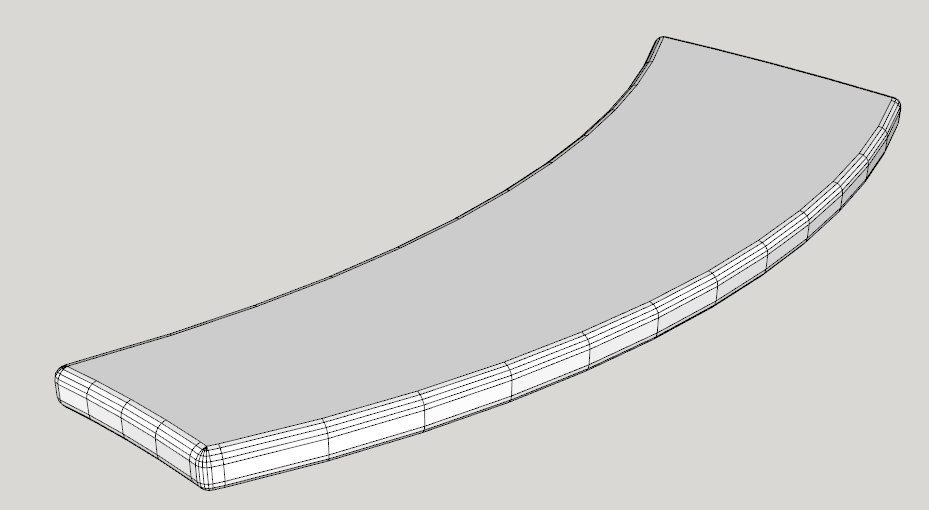
And zoomed in
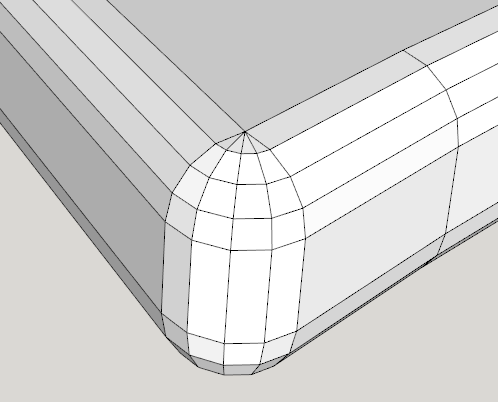
Essentially I had to find the pivot point that satisfies rounding over of the ends and then calculate all the points using the radius of the round over as an offset.
-
Preferably it would have all faces as quads and no triangles at the corners.
-
What I do is first test to see if it can be a quad - if so then let it be - otherwise it follows triangulation.
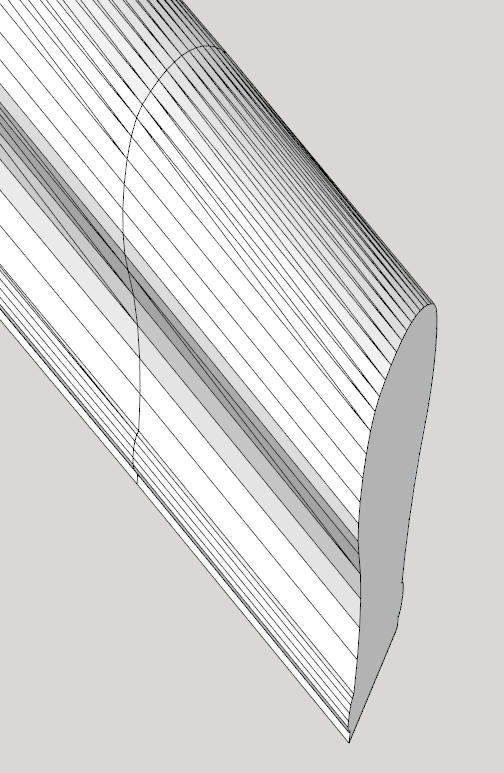
-
This is the way it is done in Max quad chamfer plugin.
-
@garry k said:
Here is a curved and flared tread.
I'm not sure I understand your point. Can't Fredo's plugin already do all that? It works on coplanar faces, just not non-coplanar faces (ones with hidden triangles).
-
@pixero said:
Preferably it would have all faces as quads and no triangles at the corners.
You are right. Quad Corners have the major benefit to be symetrical, which removes the problem of choosing the pivot direction.
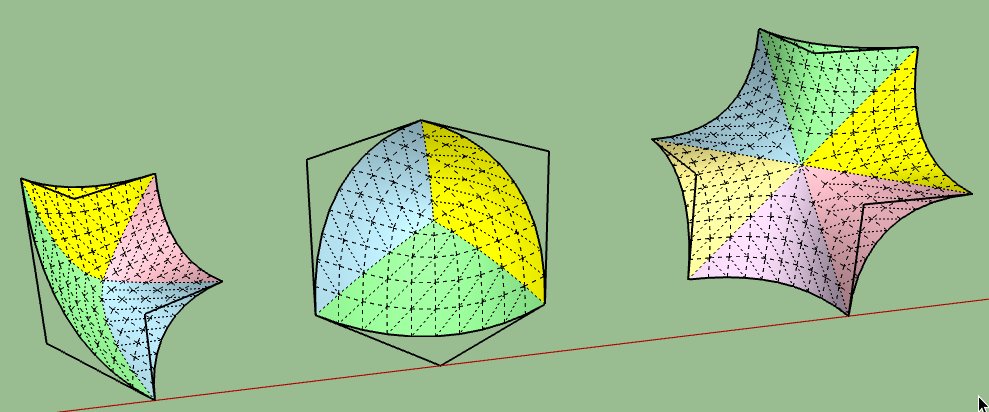
Although the corner surface is actually composed of quads, they have to be triangulated to be generated as faces in Sketchup, even in the nominal case of a perfect cube corner. And these quads are actually not 'compatible' with ThomThom Quad face tool, as they map a non quad area in the case of a Tri-edge corner.
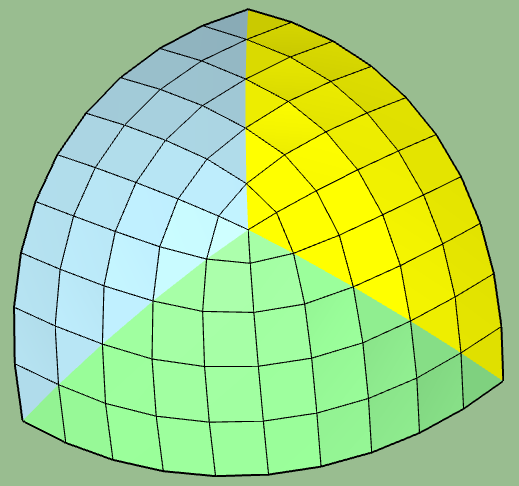
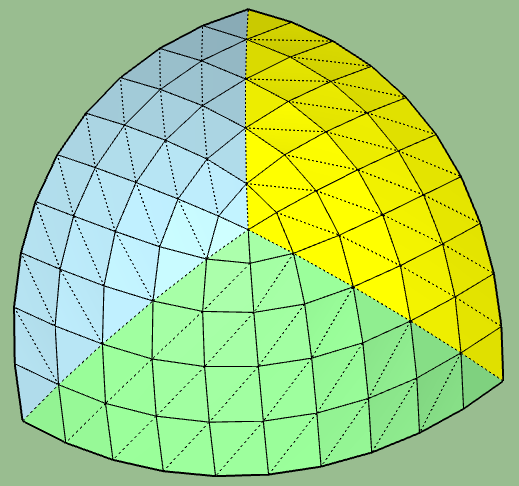
Also, it looks like the algorithm can handle various types of corners
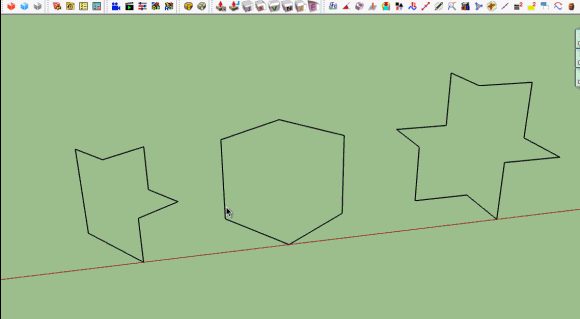
-
Wow. Fredo. How far away is this?
-
JPP (inwards) plus Round JPP works perfectly in topic starter's example.
but, a better corner handling is indeed welcomed.
P.S. (off topic) this thing is truly amazing, I put it almost in every material:
https://docs.chaosgroup.com/display/VRAY3MAX/Edge+Map+%7C+VRayEdgesTex
Advertisement







